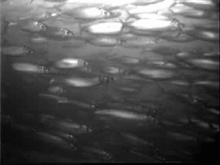herring
See also: Herring
English

Etymology
From (deprecated template usage) [etyl] Middle English hering, from (deprecated template usage) [etyl] Old English hǣring, from (deprecated template usage) [etyl] Proto-Germanic *hēringaz (“herring”), further etymology unknown. Possibly derived from Proto-Germanic *hērą (“hair”) + -ing, due to the similarity of their fine bones to hair. Cognate with Scots hering, haring (“herring”), Saterland Frisian Hiering, Häiring (“herring”), West Frisian hjerring (“herring”), Dutch haring (“herring”), German Low German Hereng, Hering (“herring”), German Hering (“herring”). French hareng, Norman ĥéren, Latin haringus, etc. are borrowings from Germanic.
Pronunciation
Noun
herring (plural herrings or herring)
- A type of small, oily fish of the genus Clupea, often used as food.
- 1913, Joseph C. Lincoln, chapter 4, in Mr. Pratt's Patients:
- Then he commenced to talk, really talk. and inside of two flaps of a herring's fin he had me mesmerized, like Eben Holt's boy at the town hall show. He talked about the ills of humanity, and the glories of health and Nature and service and land knows what all.
- Fish in the family Clupeidae.
- Fish similar to those in genus Clupea, many of those in the order Clupeiformes.
Derived terms
- Atlantic herring (Clupea harengus)
- Baltic herring (Clupea harengus membras)
- English herring (Clupea harengus)
- herringbone
- longfin herring (Lua error in Module:taxlink at line 68: Parameter "noshow" is not used by this template.)
- matjes herring
- Pacific herring (Lua error in Module:taxlink at line 68: Parameter "noshow" is not used by this template.)
- red herring
- round herring (Lua error in Module:taxlink at line 68: Parameter "noshow" is not used by this template.)
- thread herring (Lua error in Module:taxlink at line 68: Parameter "noshow" is not used by this template.)
- wolf herring (Lua error in Module:taxlink at line 68: Parameter "noshow" is not used by this template.)
Translations
fish in Clupea
|
fish in Clupeidae
fish resembling Clupea in Clupeiformes
See also
Categories:
- English terms derived from Middle English
- English terms derived from Old English
- English terms derived from Proto-Germanic
- English terms suffixed with -ing
- English 2-syllable words
- English terms with IPA pronunciation
- English terms with audio links
- Rhymes:English/ɛɹɪŋ
- English lemmas
- English nouns
- English countable nouns
- English indeclinable nouns
- English nouns with irregular plurals
- English terms with quotations
- en:Herrings

